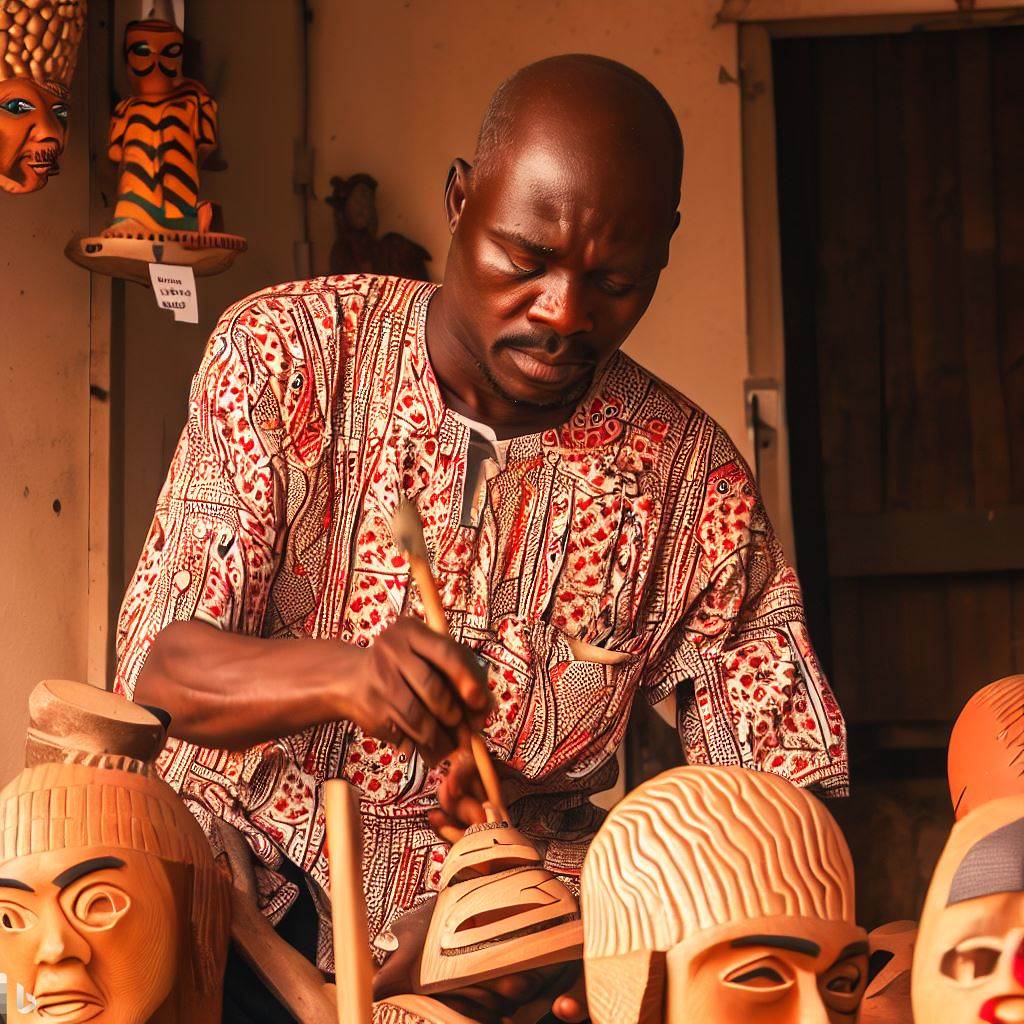Introduction
Craft apprenticeships are a type of training that involves hands-on learning with experienced professionals.
In Nigeria, they have been an important part of skill acquisition for generations. Many artisans, craftsmen, and technicians learned their trade through apprenticeships.
The importance of craft apprenticeships in Nigeria cannot be overstated.
They provide a means for people to learn technical skills that are necessary for the development of the country’s infrastructure.
A skilled workforce is necessary for any nation to grow economically. Furthermore, apprenticeships provide a way to preserve the country’s traditions and cultural heritage by passing on skills and knowledge from one generation to the next.
Overall, craft apprenticeships in Nigeria are vital for the country’s economic and cultural development. They play a critical role in producing a well-trained workforce and maintaining cultural traditions.
In the following sections, we will explore the various types of craft apprenticeships available in Nigeria, the requirements for participation, and the benefits of enrolling in a craft apprenticeship program.
Types of Craft Apprenticeships
When it comes to craft apprenticeships in Nigeria, there are different types available for interested individuals. The below list highlights the common types of craft apprenticeships in Nigeria:
Artisan Apprenticeships
Artisan apprenticeships provide individuals with practical and technical skills needed to work in fields such as carpentry, welding, and masonry. It often takes between one and three years to complete an artisan apprenticeship in Nigeria.
Technical/Vocational Apprenticeships
This type of apprenticeship is designed to offer individuals with technical skills to work in fields such as automotive mechanics and electrical installation.
Technical/vocational apprenticeships last between two and four years and include both classroom and practical training.
Professional Apprenticeships
Professional apprenticeships offer individuals the opportunity to gain specialized knowledge and expertise in professions such as accounting, law, and engineering.
They usually take between three and five years to complete and involve on-the-job training.
Creative Apprenticeships
These apprenticeships provide individuals with the skills needed to pursue careers in creative fields such as fashion design, tailoring, and graphic design. They usually take between one and three years to complete.
If you are looking to pursue a craft apprenticeship in Nigeria, below are examples of professions that offer apprenticeships:
- Carpentry
- Masonry
- Welding
- Automotive Mechanics
- Electrical Installation
- Accounting
- Law
- Engineering
- Fashion Design
- Tailoring
- Graphic Design
Apprenticeships enable individuals to learn by doing, and they offer the opportunity to gain hands-on practical experience while earning a wage.
Regardless of the type of craft apprenticeship, one decides to pursue in Nigeria, successful completion often leads to the acquisition of a job or self-employment in a specific trade.
Read: Impact of Modern Tech on Traditional Crafts in Nigeria
The Role of the Master Craftsman
The journey to becoming a skilled craftsman in Nigeria is not a smooth one as it requires a lot of hard work, dedication, and a knowledgeable mentor in the person of a master craftsman. The role of the master craftsman cannot be overemphasized as they are responsible for guiding the apprentice through the process of acquiring the necessary skills and knowledge needed to excel in the craft.
In this section, we will explore the duties, responsibilities, and importance of the relationship between the master craftsman and the apprentice, as well as how to find a reliable master craftsman.
Duties and Responsibilities of the Master Craftsman
The master craftsman is responsible for training, educating, and providing instruction to the apprentice.
They must possess in-depth knowledge and skills in the craft and must be able to teach this knowledge effectively to the apprentice. The master craftsman must also ensure that the apprentice has access to the necessary tools, equipment, and materials needed to learn and practice the craft.
Other duties of the master craftsman include setting clear expectations, outlining the goals and objectives of the apprenticeship program, monitoring the progress of the apprentice, and evaluating the apprentice’s proficiency in the craft. They must also provide guidance and support to the apprentice throughout the apprenticeship period.
Importance of the Relationship between the Master and Apprentice
The relationship between the master craftsman and the apprentice is vital to the success of the apprenticeship program. The master apprentice relationship is one of the oldest forms of education and it has proved effective in transmitting knowledge and skills from one generation to the next.
The master craftsman plays a significant role in shaping the character, values, and work ethic of the apprentice. They provide a supportive and challenging learning environment that fosters creativity, innovation, and critical thinking.
The master craftsman also serves as a role model, inspiring the apprentice to strive for excellence in the craft.
How to Find a Reliable Master Craftsman
Finding a reliable master craftsman is not an easy task. It requires research, networking, and a bit of luck. The following are some tips to help you find a reliable master craftsman:
- Networking: Reach out to your local trade associations, guilds, or unions. They can provide you with a list of master craftsmen in your area.
- Online search: Use search engines like Google to find master craftsmen in your area. Check out their websites and social media pages for information about their craft and apprenticeship programs.
- Word of mouth: Ask around in your community. Someone may know a reliable master craftsman that they can recommend.
- Visit craft shows: Attend craft shows and exhibitions in your area. You can meet and speak with master craftsmen in person and learn more about their craft.
Once you have identified a potential master craftsman, it is essential to do your due diligence before committing to an apprenticeship program.
Research their background, experience, reputation, and ask for references. It is also vital to discuss the terms and conditions of the apprenticeship program, including the length of the program, compensation, and expectations.
In essence, the master craftsman plays an essential role in the apprenticeship program, providing guidance, instruction, and support to the apprentice. They help to shape the character, values, and work ethic of the apprentice, inspiring them to excel in the craft.
To find a reliable master craftsman, you need to do your research, network, and be proactive in your search. With the right master craftsman, you can achieve your dream of becoming a skilled craftsman in Nigeria.
Read: Craftsmanship as a Sustainable Livelihood in Nigeria
Benefits of Craft Apprenticeships
Advantages of learning a craft through apprenticeship instead of formal education
- Practical experience: Craft apprenticeships offer hands-on experience that cannot be duplicated in a classroom setting. Apprentices learn by actually doing the work under the guidance of an experienced master.
- No student debt: Unlike formal education, where students incur debt to finance their education, craft apprenticeships are paid positions. Apprentices earn while they learn.
- Customized learning: Formal education is a one-size-fits-all approach. Craft apprenticeship allows for customized learning where the master tailor’s the learning to the needs of the apprentice.
Economic benefits for both apprentice and master craftsman
- Skilled labour force: Apprenticeships provide a reliable and skilled workforce to meet the demands of industries. The master also benefits from having a loyal and productive employee.
- Income for apprentices: Apprentices earn while they learn, unlike formal education, which requires students to borrow to finance their education.
- Increased earning potential: Apprentices who complete their training have higher earning potential than those without any training.
How apprenticeships contribute to preserving Nigerian culture and traditions
- Heritage preservation: Traditional crafts like weaving, pottery, and woodcarving are dying art forms in Nigeria. Apprenticeships ensure that these traditions are passed down to new generations, preserving Nigerian culture.
- Community impact: Crafts apprenticeships provide job opportunities in rural communities, which helps to combat rural migration to urban areas.
- Promotion of cultural tourism: Traditional crafts are unique and attract both local and international tourists. The preservation of traditional crafts through apprenticeships contributes to cultural tourism, which creates income opportunities for communities and individuals.
In summary, craft apprenticeships offer many benefits to both apprentices and the master craftsman.
Apprenticeships provide practical experience, customized learning and are debt-free. However, the benefits are not limited to the economic side of things. Preservation of Nigerian culture and traditions is essential, and apprenticeships contribute to this heritage preservation.
As a nation, we need to invest in craft apprenticeships and ensure that our traditions and culture are not lost.
Read: Nigerian Women in Trade Skills: Breaking Barriers

How to Apply for a Craft Apprenticeship
Are you interested in learning a craft skill through an apprenticeship program in Nigeria? Here’s a step-by-step guide on how to apply:
- Research on available apprenticeship programs in your preferred craft. Look for accredited training centers through government agencies or professional associations.
- Assess your eligibility for the apprenticeship program. Check the requirements for age, educational background, health, and other conditions set by the program provider.
- Contact the program provider and inquire about their application process. Some apprenticeship programs require a formal application through an online or offline platform, while others accept walk-in applicants.
- Prepare the necessary documents for your application. This may include your CV, academic credentials, identification documents, and any relevant certifications or training records.
- Submit your application to the program provider before the specified deadline. Make sure to follow the instructions on how to submit your application and provide accurate and complete information.
- Wait for the program provider’s response to your application. Depending on the program’s selection process, you may be invited to take an aptitude test, interview, or undergo a medical examination.
- If selected for the apprenticeship program, sign and comply with the terms and conditions of the training contract. Read and understand your apprenticeship agreement, including your rights and responsibilities, training duration, compensation, and safety measures.
- Attend the apprenticeship training program and actively participate in the learning process. Be punctual, respectful, and dedicated to acquiring the craft skills and knowledge needed for your future career.
Aside from the above steps, here are some tips on how to choose the right apprenticeship program for you
- Identify your personal and career goals. Determine your interests, strengths, and aspirations and match them with a craft apprenticeship program that can help you achieve them.
- Look for an accredited and reputable program provider. Check the program’s track record and reputation in the industry and ask for feedback from previous apprentices or graduates.
- Consider the program’s training curriculum and facilities. Look for a program that offers a comprehensive and updated training plan and has adequate equipment, tools, and materials for hands-on learning.
- Check the program’s employment opportunities and industry connections. Look for a program that can provide you with job placement assistance or has network connections with potential employers in your craft field.
- Take note of the program’s financial requirements. Some apprenticeship programs may require you to pay for tuition fees or provide stipends for training expenses. Make sure that you can afford the program’s cost or look for available scholarships or funding options.
Applying for a craft apprenticeship program in Nigeria can be a challenging but rewarding experience if you have the passion, dedication, and perseverance to learn your chosen craft.
Follow these steps and tips, and you may just be on your way to becoming a skilled craftsman and contributing to the country’s economic growth and development.
Read: Craftsmanship: The Backbone of Nigeria’s Cultural Heritage
Challenges Faced by Craft Apprenticeships in Nigeria
Craft apprenticeships in Nigeria have faced a lot of difficulties over the years. Some of these challenges include:
- Limited government support: The Nigerian government has not provided adequate support to the craft industry, causing a lack of funding and resources for apprenticeships.
- Poor working conditions: Many apprenticeships operate in poor working conditions, with inadequate tools, equipment, and infrastructure.
- Lack of standardized curriculum: There is no standardized curriculum for craft apprenticeships in Nigeria, resulting in varied quality of training.
- Low wages: Most craft apprenticeships in Nigeria pay low wages, and apprentices are sometimes not compensated at all for their work.
- Lack of recognition: Craft skills are not always valued in Nigeria, and apprenticeships are not always recognized as legitimate forms of education and training.
Despite these difficulties, there are organizations that are working to improve the system.
These organizations include:
- Technical and Vocational Education and Training (TVET) institutions: These institutions provide formal training and education in various craft skills, such as woodworking, metalworking, and weaving.
- Craft associations: These associations represent the interests of craft workers, provide training and support, and advocate for better working conditions and wages.
- Non-governmental organizations (NGOs): NGOs work with craft apprenticeships to provide funding, training, and resources, and to advocate for better policies and support from the government.
In addition, craft apprenticeships in Nigeria face a range of challenges, including limited government support, poor working conditions, and low wages.
However, organizations such as TVET institutions, craft associations, and NGOs are working to improve the system and provide better training and support for craft apprenticeships.
Conclusion
Craft apprenticeships in Nigeria remain essential to the country’s overall development. These apprenticeships provide individuals with hands-on training and practical skills that are vital to various industries, from carpentry to fashion design.
For interested individuals, pursuing a craft apprenticeship can be a life-changing decision. It offers practical training that equips individuals with the necessary skills to create their own businesses, employ others, and contribute to the economy.
Furthermore, craft apprenticeships offer individuals from different socio-economic backgrounds the opportunity to learn a trade without the need for a formal education.
As such, apprenticeships act as a tool for socio-economic mobility and promote inclusivity and diversity in the Nigerian workforce.
Therefore, individuals who have an interest in learning a trade should take advantage of the craft apprenticeships available to them. Apprenticeships offer unique opportunities for individuals to gain practical skills that can help them succeed in the long term.
All in all, craft apprenticeships are crucial, and all stakeholders must work together towards creating a robust and inclusive apprenticeship system in Nigeria.




